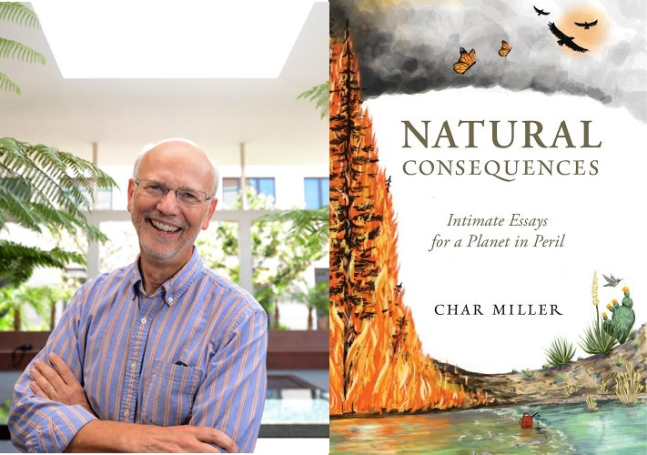Writing informed by wit and perceptiveness is easily identified but difficult to define. Dip into any piece in Natural Consequences: Intimate Essays for a Planet in Peril, and you’ll find yourself immersed in your enjoyment of the reading experience, in the individual observations of Char Miller informed by, yes, wit and perceptiveness. His ability to write about the odd intersections of life, law, and the world around us is just plain fun to read. You won’t be inclined to analyze your enjoyment, you’ll simply think, “Wow, I never thought of that before. Cool!”
And here you are. Natural Consequences collects short essays, opinion pieces, and wondering words asking excellent questions that may or may not have answers. Miller talks a good game, whether he’s exploring the problems of wildfires, the arcane minutia of water management, or simply flaneuring his way around any one of the many places he’s lived, mostly, in this book, in California.
Miller’s thoughts and writing are informed by a deep and eclectic understanding of history. He’s written about a variety of subjects, from Teddy Roosevelt’s environmentalism to marijuana policy and politics. All of this clearly goes into the mix when he’s writing these short essays, giving even the short form the breadth and depth of a longer work. And while he’s clearly able to acknowledge and understand the Big Swirly that seems have a growing grip on current events, every piece he writes has a way of bringing good cheer and an upbeat attitude. After all, the first step to solving a problem is identifying it.
Natural Consequences identifies and looks in iterative depth at a host of problems, mostly environmental. One of the more interesting effects in the reading is that even though all of the material was written well outside the 24-hour news cycle, everything here feels contemporary. He wasn’t writing about the future but he approaches the specific problems and events with the eyes of a historian. There’s always a before and he understands there will always be an after. As tied to time and place as these essays are, they’re informed by an understanding of timelessness.
Char Miller is just as witty and enjoyable in person as he is on the printed page. My guess is you’ll have the book downloaded before the interview is finished. Download it here, or start listening now. All too soon, now will be then. As you read, as you listen, you’ll realize, it’s never too late to start anew.





